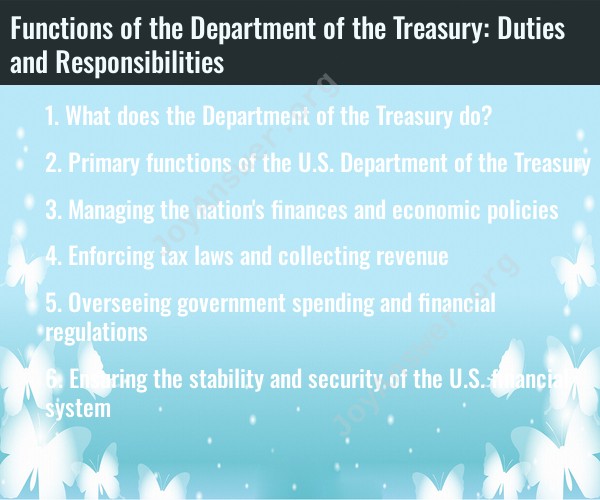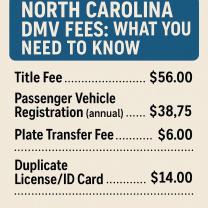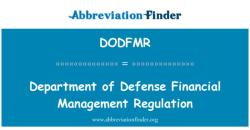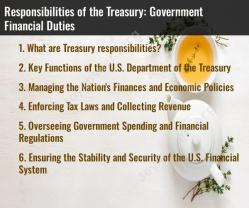What does the Department of the Treasury do?
The United States Department of the Treasury is a federal executive department responsible for managing the government's finances, formulating and implementing economic and fiscal policy, and overseeing various financial and economic matters. Here are some of the key functions, duties, and responsibilities of the Department of the Treasury:
Financial Management:
- Revenue Collection: Administering the collection of federal taxes, customs duties, and other revenue streams.
- Debt Management: Managing the issuance and servicing of the national debt.
Economic Policy Formulation:
- Monetary Policy: Working with the Federal Reserve to formulate and implement monetary policy to achieve stable prices and maximum sustainable employment.
- Fiscal Policy: Developing and recommending fiscal policies related to government spending, taxation, and budgeting.
Regulation and Oversight:
- Financial Institutions: Regulating and overseeing financial institutions, including banks, credit unions, and thrifts, to ensure their stability and soundness.
- Financial Markets: Overseeing and regulating financial markets to promote fair and efficient operations.
Currency and Coinage:
- Currency Production: Minting and issuing coins and printing paper currency.
- Currency Design: Designing and maintaining the security of U.S. currency.
International Economic Affairs:
- Trade and Investment Policies: Formulating policies related to international trade, investment, and economic cooperation.
- Exchange Rate Policy: Managing exchange rate policies to promote international economic stability.
Enforcement of Laws:
- Law Enforcement: Enforcing various financial laws and regulations, including those related to counterfeiting, money laundering, and economic sanctions.
Treasury Securities:
- Issuance of Securities: Issuing and managing U.S. Treasury securities, such as Treasury bonds, bills, and notes, to raise funds for the government.
Financial Assistance Programs:
- Economic Stimulus: Implementing programs and measures to address economic challenges, including stimulus packages during economic downturns.
- Financial Aid: Administering financial assistance programs, such as grants, loans, and guarantees, to support specific economic sectors or initiatives.
Financial Intelligence:
- Financial Intelligence Unit (FinCEN): Combating financial crimes by collecting, analyzing, and disseminating financial intelligence related to money laundering and other illicit activities.
Internal Revenue Service (IRS):
- Tax Administration: Administering and enforcing the Internal Revenue Code, collecting taxes, and providing taxpayer services through the IRS.
Treasury Departments and Bureaus:
- Bureaus and Offices: Overseeing various bureaus and offices within the Department of the Treasury, each with specific responsibilities, such as the Bureau of Engraving and Printing, the Alcohol and Tobacco Tax and Trade Bureau (TTB), and the Office of Foreign Assets Control (OFAC).
The Secretary of the Treasury, who is a member of the President's Cabinet, leads the Department of the Treasury and advises the President on economic and financial matters. The Treasury plays a crucial role in shaping and implementing economic policies that impact the nation's fiscal health and stability.
Sure, here is an overview of the primary functions of the U.S. Department of the Treasury:
Managing the nation's finances and economic policies
The U.S. Department of the Treasury plays a central role in managing the nation's finances and shaping economic policies. It is responsible for:
Formulating and implementing fiscal policy: The Treasury develops and implements fiscal policy, which uses government spending and taxation to influence the economy. This includes preparing the federal budget, managing the national debt, and advising the President on economic matters.
Issuing and managing government debt: The Treasury issues and manages Treasury securities, such as bonds and bills, to finance the government's debt. This ensures that the government has the funds to meet its financial obligations.
Overseeing the financial services industry: The Treasury oversees the financial services industry through its regulatory agencies, such as the Financial Crimes Enforcement Network (FinCEN) and the Office of the Comptroller of the Currency (OCC). This helps maintain financial stability and protect consumers.
Enforcing tax laws and collecting revenue
The Treasury is responsible for enforcing tax laws and collecting revenue to fund government operations. This includes:
Administering the tax code: The Treasury develops and implements tax regulations and provides guidance on tax compliance. It also works with the Internal Revenue Service (IRS) to enforce tax laws and collect taxes.
Collecting customs duties and fees: The Treasury collects customs duties and fees on imports to protect domestic industries and generate revenue.
Enforcing sanctions and trade regulations: The Treasury enforces sanctions and trade regulations to promote national security and economic interests.
Overseeing government spending and financial regulations
The Treasury oversees government spending and financial regulations to ensure that taxpayer dollars are used efficiently and responsibly. This includes:
Reviewing and approving federal agency spending: The Treasury reviews and approves federal agency spending requests to ensure that they align with the government's priorities and budgetary constraints.
Developing and implementing financial regulations: The Treasury develops and implements financial regulations to protect consumers, maintain market stability, and prevent financial crises.
Providing financial assistance to state and local governments: The Treasury provides financial assistance to state and local governments through programs like the State and Local Fiscal Assistance Fund (SLFAF).
Ensuring the stability and security of the U.S. Financial System
The Treasury plays a crucial role in ensuring the stability and security of the U.S. financial system. It is responsible for:
Protecting the financial system from cyberattacks: The Treasury works with other agencies to protect the financial system from cyberattacks and cyber threats.
Addressing financial crises: The Treasury has the authority to intervene and address financial crises to maintain financial stability and protect the economy.
Promoting international financial cooperation: The Treasury works with international organizations to promote financial cooperation and stability around the world.
These are just some of the many important functions of the U.S. Department of the Treasury. The Treasury's work has a significant impact on the economy, the financial system, and the lives of all Americans.











